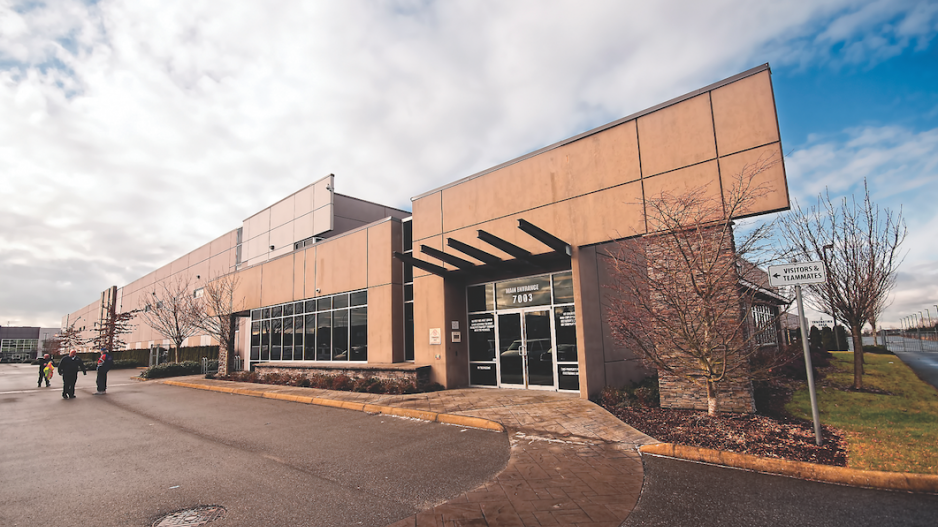The British Columbia Liquor Distribution Branch (BCLDB) is facing continued criticism over its planned move into a larger warehouse in Delta.
Critics say the plan is a waste of government money and that a more efficient move would be to have much of the province’s liquor flow directly from private warehouses to private stores and restaurants to reduce the amount of warehouse space the BCLDB requires.
The BCLDB plans to move out of 220,000 square feet of warehouse space at 3200 East Broadway in Vancouver in spring 2018 and into a 412,057-square-foot location at 7003 72nd Street in Delta, which is a former Home Depot warehouse.
The BCLDB will continue to lease 167,500 square feet of head office space at 3200 East Broadway.
Original estimates were that the BCLDB would move into a much bigger warehouse – as large as 1.2 million square feet – but “modern warehouse management processes” make the 412,057-square-foot Delta space sufficiently large, according to a statement the minister responsible for the BCLDB, Coralee Oakes, sent to Business in Vancouver.
The government sold its current East Broadway head office and warehouse space for $37 million in 2014 to a partnership that includes the Aquilini Investment Group and the Musqueam, Tsleil-Waututh and Squamish First Nations. It has since been leasing that space.
A service plan released earlier this month says the warehouse move is needed because the current space is so small that it is “constrained to no more than 10 days of inventory.”
But Vancouver lawyer and liquor policy expert Mark Hicken said a better solution would be for the BCLDB to stop warehousing alcohol that is bound for private stores or restaurants.
Cioppino’s owner Pino Posteraro agreed.
Restaurants have to buy alcohol directly from the B.C. government’s retail stores, but Posteraro said it would be faster and more reliable if his shipments did not need to be taken on a shuttle run on the way to his Yaletown eatery.
Private companies, such as ContainerWorld and JF Hillebrand, provide logistical support for private liquor stores and restaurants, and import wine, beer and spirits. The companies then store the products in their Metro Vancouver warehouses.
The BCLDB authorizes the third-party warehouses to deliver B.C.-made beer, wine and liquor directly to private stores and restaurants – but all imported products must flow through the BCLDB warehouse.
“There are always hiccups and mistakes,” Posteraro said. “[The computer] will show that, at ContainerWorld, there are four cases, but you order the wine and it is not available. It is not at the government warehouse.”

(Image: Cioppino’s owner Pino Posteraro would like to have a streamlined system for ordering wine | Rob Kruyt)
Hicken said he understands BCLDB’s wanting to warehouse alcohol bound for government liquor stores because that is a large retail chain, and most large retail chains warehouse products destined for their stores.
“What I can’t really see is why product that is destined for private retailers or hospitality customers needs to move from the private warehouses, where it is first stored, to an intermediary government warehouse,” he said.
BCLDB statistics show that 39% of the volume that the liquor monopoly distributes is outside of its own government stores.
“The BCLDB obviously needs a method of collecting their markup and taxes, but I’m not sure why you actually have to transport the bottles to a secondary warehouse in order to do that,” Hicken said.
A BCLDB statement maintains that the current system allows it to track alcohol imports and ensure that the appropriate mark-up is collected.
The B.C. government had planned to privatize the BCLDB’s warehousing and distribution business. In 2012, it cancelled those plans after Business in Vancouver reported on leaked documents that showed the leading bidder, Ohio-based Exel Logistics, sought to use its BC Liberal-connected lobbyists to influence the writing of tendering documents.
The government admitted that it had no business case for the privatization, and it canned its strategy to privatize the wholesale division at the same time that it agreed to a new contract with the BC Government and Service Employees’ Union in 2012. •




